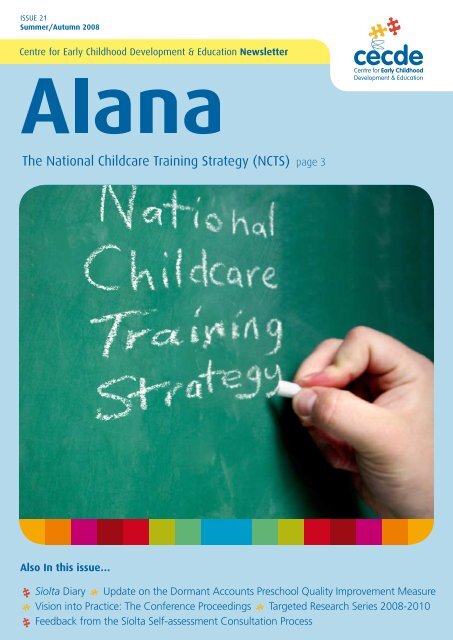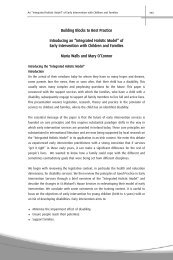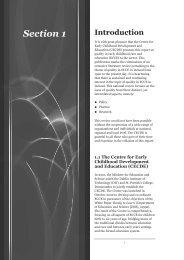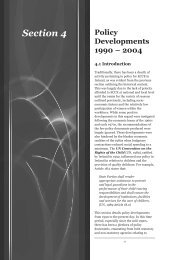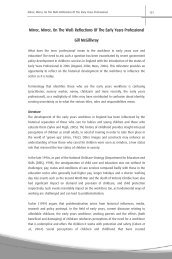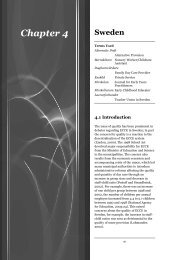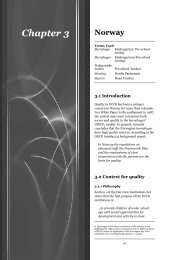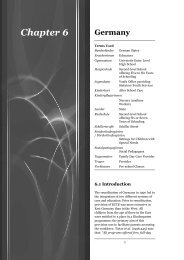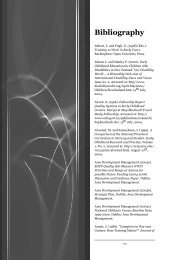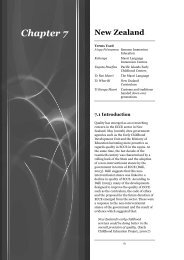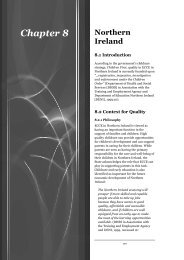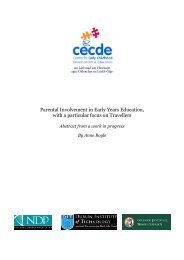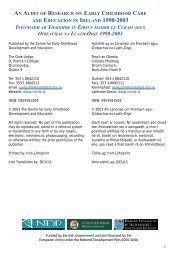Issue 21 - Centre for Early Childhood Development & Education
Issue 21 - Centre for Early Childhood Development & Education
Issue 21 - Centre for Early Childhood Development & Education
You also want an ePaper? Increase the reach of your titles
YUMPU automatically turns print PDFs into web optimized ePapers that Google loves.
ISSUE <strong>21</strong><br />
Summer/Autumn 2008<br />
<strong>Centre</strong> <strong>for</strong> <strong>Early</strong> <strong>Childhood</strong> <strong>Development</strong> & <strong>Education</strong> Newsletter<br />
The National Childcare Training Strategy (NCTS) page 3<br />
Also In this issue…<br />
Síolta Diary Update on the Dormant Accounts Preschool Quality Improvement Measure<br />
Vision into Practice: The Conference Proceedings Targeted Research Series 2008-2010<br />
Feedback from the Síolta Self-assessment Consultation Process
Welcome...<br />
To this edition of ‘Alana’.<br />
Heino Schonfeld<br />
Contents<br />
Editorial 02<br />
The National Childcare<br />
Training Strategy 03<br />
Update on the Dormant<br />
Accounts Preschool Quality<br />
Improvement Measure 04<br />
Feedback from the<br />
Síolta Self-Assessment<br />
Consultation Process 05<br />
Síolta Diary 05<br />
Vision into Practice:<br />
The Conference Proceedings 06<br />
ICIN News 06<br />
Mary O'Kane 06<br />
Targeted Research Series<br />
2008-2010 06<br />
Editor<br />
Heino Schonfeld<br />
Printers<br />
Print Media Services<br />
If you have any comments or suggestions<br />
<strong>for</strong> this newsletter, please contact the In<strong>for</strong>mation<br />
Officer at 01 884<strong>21</strong>13 or by email at<br />
peadar.cassidy@spd.dcu.ie.<br />
Special thanks to Áine Nolan and DCULS <strong>for</strong> their work<br />
on the Irish translation of the Alana Newsletter.<br />
The economic cycle in Ireland has reached its peak and is now turning<br />
downwards. This, in itself is hardly surprising. Anyone old enough will have<br />
experienced a number of these cyclical events in her or his lifetime. What is<br />
different, though, is the rapid and drastic nature of the downturn. Combined<br />
with an astounding overestimate of this year’s tax take by the Government this<br />
has led to a serious fiscal imbalance. There are a number of options to address<br />
this imbalance: borrowing (limited scope due to EU rules), increasing revenue<br />
(mainly through tax increases) or a reduction in public expenditure. It appears<br />
that our Government prefers to consider the latter option at present.<br />
In this situation it is crucial to prioritise public expenditure and in particular<br />
to differentiate between general costs and areas of investment, that is<br />
expenditure which promises economic returns and increases the country’s<br />
competitiveness.<br />
At the recent launch of Barnardos’ 2007 Annual Report, Prof John Fitzgerald of<br />
the Economic and Social Research Institute said early intervention in vulnerable<br />
children’s lives was vital if potential economic and social costs were to be<br />
tackled. He is not alone with this view. Indeed, the statement summarises<br />
a very large and increasing body of evidence <strong>for</strong> public investment in early<br />
childhood education. While the rate of return varies from study to study, there<br />
is no doubt anymore that investment in early childhood education yields quite<br />
extraordinary returns in real money – in addition to the obvious gains in human<br />
and social capital.<br />
It is there<strong>for</strong>e not surprising that the National Competitiveness Council strongly<br />
supports “the provision of ring-fenced funding <strong>for</strong> the development of preprimary<br />
education, required <strong>for</strong> facilities and teacher training, targeted initially<br />
in areas of greatest socio-economic and educational disadvantage.” <br />
As recently as July 18th of this year the National Economic and Social Council<br />
published a major report on ‘The Irish Economy in the <strong>Early</strong> <strong>21</strong>st Century’ and<br />
stated politely “the Council considers that, in constructing a national system of<br />
early childhood education and care, policy has, so far, not displayed anything<br />
like the boldness with which Ireland remedied deficits in the provision of<br />
secondary education in the late 1960s and in third level in the 1970s.”<br />
The message is clear: early childhood education is not a luxury only af<strong>for</strong>dable<br />
in good times but an essential investment <strong>for</strong> the future of our children and<br />
our economy. The question is whether Government will get the message in<br />
time. Given the delay in the rollout of the early childhood education strand of<br />
the DEIS programme, one has to remain doubtful.<br />
Heino Schonfeld<br />
National Competitiveness Council (2007). Annual Competitiveness<br />
Report 2006. Volume 2: Ireland’s Competitiveness Challenge. Dublin:<br />
National Competitiveness Council.<br />
National Economic and Social Council (2008). The Irish Economy in the <strong>Early</strong><br />
<strong>21</strong>st Century. Dublin: The National Economic and Social Council.<br />
2
The National Childcare Training Strategy (NCTS)<br />
By Maresa Duignan, Assistant Director, CECDE<br />
A commitment was made as part of<br />
the National Childcare Investment<br />
Programme (NCIP) (2007 – 2010)<br />
to put in place a national training<br />
strategy to ensure that the ECCE<br />
work<strong>for</strong>ce would be appropriately<br />
qualified and professionally prepared<br />
to carry out the challenging work of<br />
supporting the optimal well-being,<br />
learning and development of children<br />
in their care.<br />
For the past year the CECDE has been<br />
participating in an interdepartmental<br />
working group with representatives<br />
from the Departments of <strong>Education</strong><br />
and Science, Enterprise, Trade and<br />
Employment and the Office <strong>for</strong> the<br />
Minister <strong>for</strong> Children and Youth<br />
Affairs and chaired by the National<br />
Qualifications Authority of Ireland. The<br />
initial challenge <strong>for</strong> the group was to<br />
establish the qualifications profile of<br />
the existing ECCE work<strong>for</strong>ce and the<br />
range and nature of education and<br />
training provision that is available. It<br />
became immediately apparent that<br />
the availability of such data is very<br />
limited and there<strong>for</strong>e a great deal<br />
of primary research was required<br />
to establish reliable baselines upon<br />
which to build a training strategy<br />
<strong>for</strong> the future. Additionally, the<br />
development of practice frameworks<br />
such as Síolta (CECDE, 2006) and the<br />
National Council <strong>for</strong> Curriculum and<br />
Assessment’s (NCCA) <strong>Early</strong> Learning<br />
Framework (NCCA, Forthcoming)<br />
and other policy developments such<br />
as the Revised Preschool Regulations<br />
(Department of Health and Children<br />
[DHC], 2006), the Disability Act (DHC,<br />
2005), and the Delivering Equality in<br />
Schools (DEIS) Strategy (DES, 2005),<br />
to name but a few, required that the<br />
Model Framework <strong>for</strong> <strong>Education</strong>,<br />
Training and Professional <strong>Development</strong><br />
published by the Department of<br />
Justice, Equality and Law Re<strong>for</strong>m in<br />
2002, would need to be revisited to<br />
ensure that the occupational profiles it<br />
proposed were still valid.<br />
At the time of writing, a final draft<br />
of a consultation document, which<br />
will distil all of the collected data and<br />
pose a series of questions designed to<br />
in<strong>for</strong>m the development of the NCTS,<br />
is nearing completion. It is anticipated<br />
that this will be made available in<br />
the Autumn of this year and that the<br />
CECDE will manage a consultation<br />
process on the key issues raised.<br />
This is an important policy initiative<br />
that has the potential to trans<strong>for</strong>m<br />
the delivery of ECCE services in<br />
Ireland and we would encourage all<br />
organisations, practitioners, parents<br />
and children to participate fully in<br />
this consultation process and ensure<br />
your views are represented in the final<br />
National Childcare Training Strategy.<br />
For further in<strong>for</strong>mation see our<br />
website www.cecde.ie.<br />
3
Update on the Dormant Account<br />
Preschool Quality<br />
Improvement Measure<br />
By Bronagh Cleland, <strong>Development</strong> Officer, CECDE<br />
Bronagh Cleland<br />
Over 200 preschools that feed into<br />
Primary Schools that are recognized<br />
as experiencing a high level of<br />
<strong>Education</strong>al Disadvantage have<br />
recently applied <strong>for</strong> funding under the<br />
Dormant Account Preschool Quality<br />
Improvement Measure.<br />
The scheme that was introduced<br />
under the <strong>Early</strong> <strong>Education</strong> strand<br />
of the Delivering Equality of<br />
Opportunity in Schools programme<br />
(DEIS) was accessed through the<br />
Dormant Accounts fund. DEIS is<br />
a major intervention operated by<br />
the Department of <strong>Education</strong> and<br />
Science (DES) to combat educational<br />
disadvantage. The funding <strong>for</strong> the<br />
Preschool Quality Improvement<br />
Measure was accessed through the<br />
Dormant Accounts fund and is being<br />
administered by the CECDE on behalf<br />
of the DES.<br />
The funding is being offered to<br />
support the implementation of quality<br />
measures as outlined in Síolta, the<br />
National Quality Framework <strong>for</strong> <strong>Early</strong><br />
<strong>Childhood</strong> <strong>Education</strong>.<br />
There was a range of applications<br />
made under the Síolta Standard<br />
Environments. These included<br />
replacing worn and poor quality<br />
furniture and equipment with child<br />
appropriate alternatives. However the<br />
majority of preschools that applied<br />
<strong>for</strong> funding under this standard did so<br />
to develop and upgrade the outdoor<br />
environment. There were also a<br />
number of applications made under<br />
the Transitions Standard including a<br />
joint proposal from 14 preschools to<br />
work with the 9 primary schools in<br />
their local area to support children’s<br />
transitions from the preschool to the<br />
primary school. A significant number<br />
of preschools applied <strong>for</strong> funding<br />
<br />
<strong>for</strong> staff to take part in further<br />
professional development including<br />
the areas of First Aid and Special<br />
<strong>Education</strong>al Needs. Other popular<br />
Standards under which preschools<br />
applied included Play, Curriculum and<br />
Parents and Families.<br />
This funding measure closed on 4th<br />
July 2008. Successful applicants will be<br />
notified in the coming months. Further<br />
details of the approved projects will be<br />
published in the next edition of Alana.
Feedback from the Síolta Selfassessment<br />
Consultation Process<br />
By Karen Mahony, <strong>Development</strong> Officer, CECDE<br />
The CECDE recently carried out<br />
a process of consultation with its<br />
Consultative Committee on the newlydeveloped<br />
Síolta Self-assessment<br />
Instrument and accompanying<br />
Exemplars. In total 44% of the<br />
representative organisations on the<br />
Committee responded; this included<br />
100% of those organisations with<br />
a role in supporting high quality<br />
practice in the ECCE sector. The<br />
majority of respondents endorsed<br />
the instrument and the exemplars at<br />
every level. However, a small number<br />
of respondents suggested minor<br />
amendments or revisions which the<br />
CECDE considered and amendments<br />
were made as appropriate.<br />
Following the detailed consultation<br />
process and the revision of the<br />
instrument and exemplars, an in<strong>for</strong>mal<br />
Practitioner Advisory Forum was<br />
established to audit the language used<br />
and the content of the exemplars<br />
specific to each setting type.<br />
With a high endorsement from the<br />
sector, the CECDE is confident that<br />
the revisions made to the tool and<br />
its exemplars reflect best practice<br />
within the Irish context and we are<br />
now in a position to pilot the tool this<br />
coming September. We would like<br />
to take this opportunity to thank all<br />
the organisations and practitioners<br />
who contributed to the above process<br />
through the CECDE Consultative<br />
Committee and the Practitioner<br />
Advisory Forum. As ever, we greatly<br />
value the time and ef<strong>for</strong>t that individuals<br />
contribute to develop and support<br />
quality within the ECCE sector.<br />
For a more detailed outline of<br />
the consultation findings, please<br />
see http://www.cecde.ie/english/<br />
consultation_assessment.php.<br />
Karen Mahony<br />
Síolta Diary<br />
By Maresa Duignan, Assistant Director<br />
It would appear from the media<br />
and indeed echoed by the weather,<br />
that Summer 2008 will not be the<br />
re-energising, sunshine soaked<br />
respite that we all so desperately<br />
need! Despite the doom and gloom<br />
however, I continue to be encouraged<br />
by the continuing endeavors of ECCE<br />
practitioners towards improving the<br />
quality of both practice and service<br />
provision. Our Síolta workshops are<br />
being delivered all over the country<br />
to enthusiastic groups and we have<br />
finally been able to advertise two<br />
Síolta Coordinator posts thanks to<br />
our collaboration with the three<br />
early intervention and prevention<br />
programmes in Dublin (see Alana,<br />
Spring 2008). These new posts will<br />
facilitate the establishment of pilot<br />
processes designed to evaluate and<br />
where necessary refine the materials,<br />
resources and processes associated<br />
with the Síolta Quality Assurance<br />
Programme. We are very excited<br />
to finally be able to engage in this<br />
essential work, which is a vital<br />
prerequisite <strong>for</strong> a national roll-out<br />
of the programme. We hope that<br />
in the future there will be more of<br />
these posts as we continue to build<br />
up the quality of our early childhood<br />
education services <strong>for</strong> young children<br />
in Ireland.<br />
So in the absence of sunshine,<br />
perhaps we can all draw some<br />
energy from the fact that positive<br />
steps are being taken to facilitate the<br />
final phase in the development of<br />
Síolta which we believe will serve to<br />
recognise and validate the excellent<br />
work of the ECCE community in<br />
Ireland.<br />
Maresa Duignan<br />
5
Vision into Practice: The<br />
Conference Proceedings<br />
The CECDE is delighted to announce that the conference proceedings from<br />
Vision into Practice: Making Quality a Reality in the Lives of Young Children have<br />
now been published. The 2nd CECDE International Conference was held in<br />
Dublin Castle, February 8th-10th, 2007. The published proceedings include <strong>for</strong>ty<br />
papers as well as the three keynote addresses, all of which were peer-reviewed<br />
by a panel selected from the ECCE community in Ireland.<br />
Vision into Practice can be downloaded from the CECDE website (www.<br />
cecde.ie) or contact the office at 01 884<strong>21</strong>10 or early.childhood@spd.dcu.<br />
ie <strong>for</strong> details of how to order a published copy.<br />
Targeted Research<br />
Series 2008 - 2010<br />
Following on from the success of the CECDE’s initial targeted research series,<br />
we announced earlier this year that we would be tendering <strong>for</strong> a further<br />
four projects. We are now delighted to reveal that we have recently awarded<br />
this funding. The working titles as well as the research institutes and key<br />
researchers are as follows:<br />
1. Targeted <strong>Early</strong> <strong>Childhood</strong> <strong>Education</strong>al Provision within a Cluster of<br />
DEIS Settings<br />
The <strong>Centre</strong> <strong>for</strong> Social and <strong>Education</strong>al Research, Dublin Institute of<br />
Technology<br />
Dr. Nóirín Hayes and Dr. Mary O’Kane<br />
2. Bringing Practitioners and Parents Together – <strong>Development</strong> of a<br />
Framework <strong>for</strong> Action <strong>for</strong> Promoting Cultural Diversity in <strong>Early</strong><br />
<strong>Childhood</strong> <strong>Education</strong> Settings<br />
The <strong>Centre</strong> <strong>for</strong> Social and Family Research, Water<strong>for</strong>d Institute of<br />
Technology<br />
Fergus Hogan, Jonathan Culleton, Máire O’Reilly, Jacqui Duggan and<br />
Claire Nolan<br />
Congratulations<br />
to Mary O’Kane<br />
Congratulations are due to Mary<br />
O’Kane who was recently awarded<br />
her PhD from the Dublin Institute of<br />
Technology <strong>for</strong> “Building Bridges: The<br />
Transition from Preschool to Primary<br />
School <strong>for</strong> Children in Ireland”. Mary<br />
is the first of the original cohort of<br />
CECDE-sponsored PhD students to<br />
complete her studies. The finished<br />
thesis, one of the few pieces of<br />
research completed in the area of<br />
Transitions in ECCE in Ireland, is<br />
available from the CECDE Library and<br />
can also be accessed online at http://<br />
www.cecde.ie/english/maryokane.php.<br />
3. Professional <strong>Development</strong> <strong>for</strong> <strong>Early</strong> <strong>Childhood</strong> Professionals -<br />
Examining Pedagogy in <strong>Early</strong> <strong>Childhood</strong><br />
Stranmillis University College<br />
Dr. Glenda Walsh, Dr. Colette Gray, Sheelagh Carville, Karen Hanna and<br />
Dorothy McMillan<br />
4. <strong>Development</strong> of a Framework <strong>for</strong> Action <strong>for</strong> the Inclusion of<br />
Children with Special Needs in <strong>Early</strong> <strong>Childhood</strong> <strong>Education</strong> Settings<br />
The Curriculum <strong>Development</strong> Unit, Mary Immaculate College Limerick in<br />
conjunction with Limerick City Childcare Committee<br />
Eucharia McCarthy and Mary Moloney.<br />
Please check out our website at http://www.cecde.ie/english/<br />
targeted_projects.php <strong>for</strong> further in<strong>for</strong>mation.<br />
Mary O’Kane


